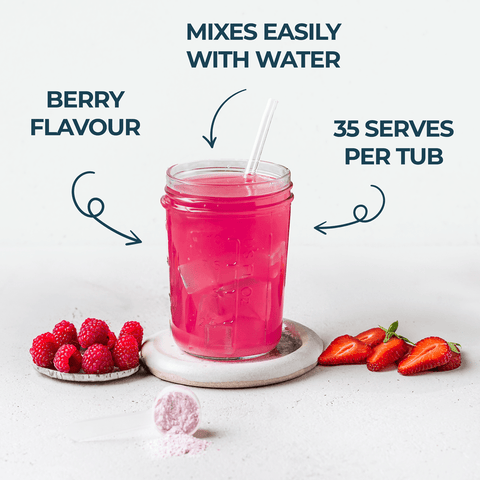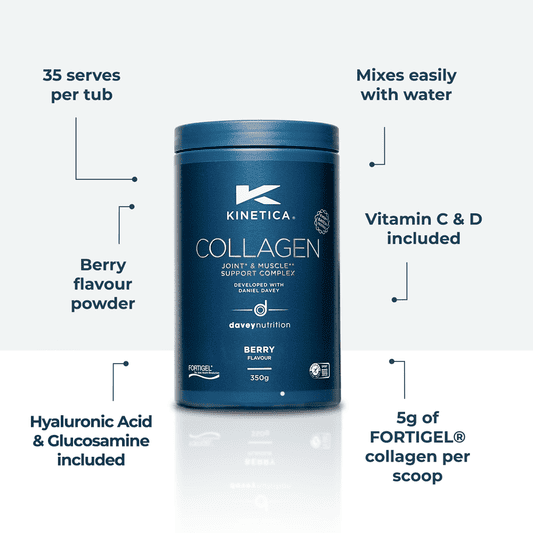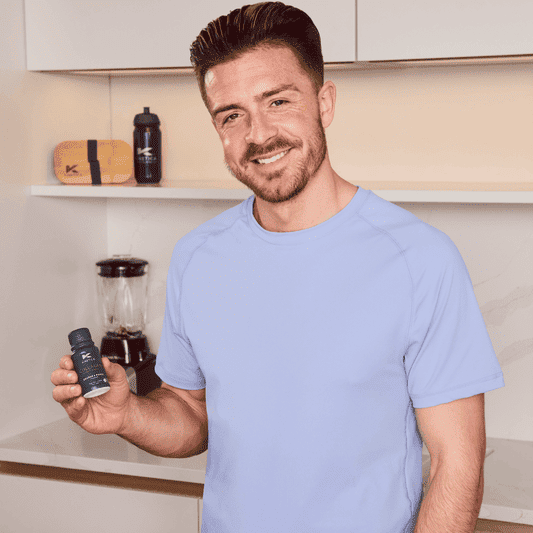What are the Different Types of Collagen

What is collagen?
Why should I take collagen?
What are the different types of collagen?
What form of collagen should I take?
When is the best time to take collagen ?
Why choose Kinetica Collagen Joint* & Muscle** Support Complex?
What is collagen?
Collagen makes up one-third of all protein in the body and is the most abundant form of structural protein in tendons, cartilage and bones. As collagen is the principal component of the extracellular matrix (ECM), it is vital for the strength and regeneration of this tissue. The ECM is ‘a large network of proteins and other molecules that surround, support and provide structure to cells and tissues in the body’. Collagen is made up of three amino acids—glycine, proline, and hydroxyproline. There are different types of collagen in the body, all with slightly different roles but 80 – 90 % of the collagen in the body consists of types I, II, and III.
Why should I take Collagen?
Collagen supports the mechanical strength and elasticity of tissues and acts as a natural substrate for cellular development. The research on collagen supplementation is still in its relative infancy, but results in the following areas are showing great promise to support a number of areas in health and sports performance. Collagen has been found to enhance synthesis or growth in different musculoskeletal tissues, including cartilage, ligaments, and bone. For this reason, collagen supplementation has positively linked to healthy aging, healing and repair in the skeletal system [1].
Collagen supplementation can benefit:
- Increasing the level of collagen available in the body for repair
- Recovery from injury, tendons, bone and cartilage
- Wound healing
- Stronger bones and joints for injury resistance
What are the different types of collagen?
Type I collagen forms the hard tissue in bone, cartilage, tendons, teeth and connective tissue and is the most common form of collagen within the body.
Type II collagen (also known as hyaline or articular cartilage) is the gel-like substance designed to provide cushioning and allow joints to absorb shock.
Type III collagen supports the structure of muscles, skin, organs, and arteries.
Collagen comes in a number of different forms, bovine collagen, marine collagen and more recently vegan collagen which is created from genetically modified yeast and bacteria. Bovine and marine collagen have different amino acids profiles and contain different proportions of type II and type III collagen in particular. Collagen supplements have been used in the cosmetic industry with the aim of helping to support healthy aging, retain collagen in the skin and improve skin elasticity. To date, the most well researched collagen for joint health and supplementation for injury recovery, is bovine collagen. Bovine collagen is most commonly used to support joint, cartilage and tendon health while marine collagen is used for skin, hair and nail health.
What form of collagen should I take?
Collagen supplements now come in many forms, examples include gels, liquid or collagen shot and collagen powder. The form you take comes down to what you are trying to achieve and what format suits you best. If you need collagen for joint health or injury recovery and you have a prolonged period of rehabilitation then taking collagen in powder supplement form makes most sense. What is important is that you are taking the right collagen type for a specific purpose, so if you’re suffering from a joint injury for example, make sure to choose an option that includes a hydrolysed collagen peptide, such as FORTIGEL® which has been included in the Kinetica X daveynutrition Joint and Muscle Support Complex.

Learn More: Collagen Supplements
When is the best time to take collagen?
The intake protocol for Collagen Powder joint and support complex is a little different to something like whey protein because it's about the availability of the key nutrients over the course of time. Put simply, what matters most is that it's taken daily for general skeletal health. For recovery from injury the evidence points more specifically to taking collagen within the hour before your training, workout or rehabilitation session.
You have to stick to your collagen ritual
From my experience with athletes who choose to include collagen supplementation as part of their nutrition strategy, compliance with the long-term protocol is the biggest challenge. Other supplements like creatine or caffeine can show acute or certainly shorter-term benefits which provides affirmation to effort involved. Unfortunately, this is not the case with collagen supplements. Find a way that works for you when it comes to your routine or ritual. Maybe taking it in the morning as part of your hydration routine or in your pre or post workout recovery drink / smoothie could work for you? Some athletes might even take it before bed as part of their night time routine. Being consistent over time is the key message here, it simply will not have the best impact for you if you are not consistent.
Why choose Kinetica Collagen Joint & Muscle Support Complex
The Kinetica Collagen Joint and Muscle Support Complex brings together the best possible evidence-based ingredients to support joint, tendon and skeletal health. The patented collagen FORTIGEL® from Gelita, is one of the most highly regarded collagen brands in the industry and has been used as the key ingredient. It produces the highest level of impact on the tendon and joints in the body. Research on FORTIGEL® has shown that it is ‘absorbed intestinally and accumulates in cartilage’. Most significantly, it has been shown to stimulate cartilage metabolism.

The arrival of this product is a big moment for me personally and for what it says about my relationship with Kinetica who backed this idea and who have worked nonstop to make this happen. To have a product I believe can make a genuine difference to longer term skeletal health and offer athletes a cutting-edge solution to support their recovery in times of great frustration, is extremely gratifying.








